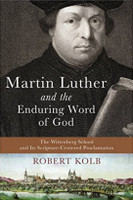
Kolb, Robert
The concept of God's two kingdoms was foundational to Luther and subsequent Lutheran theology. Since the middle of the nineteenth century, that concept has been understood primarily in political terms. The most striking example is the Nazi corruption of the concept into a dualism that separated one's activities in the realms of church and state. But is a political reading of the two kingdoms a perversion of Luther's teaching? Leading Reformation scholar William Wright contends that those who read Luther politically and see in Luther a compartmentalized approach to the Christian life are misreading the Reformer.
For Luther, both kingdoms were under the laws and rule of God. Wright reassesses the original breadth of Luther's theology of the two kingdoms and the cultural contexts from which it emerged, showing the influence early Renaissance humanism had on Luther. He argues that Luther's two-kingdom worldview was not a justification for living irresponsibly or carelessly on planet earth. The book includes a variety of Luther's writings that reveal what the Reformer did and did not intend by the concept. These writings show how the two kingdoms converge in all areas of life: family, church, and society.
Table of Contents:
Author
William J Wright (PhD, Ohio State University) is professor of history and head of the history department at the University of Tennessee at Chattanooga. In addition to his many scholarly articles and presentations, he is the author of Capitalism, the State, and the Lutheran Reformation.
Endorsement
"A learned and revolutionary new assessment of Luther's understanding of the two kingdoms. This book will be required reading for anyone seeking to explore Luther on this topic for years to come." - David M Whitford